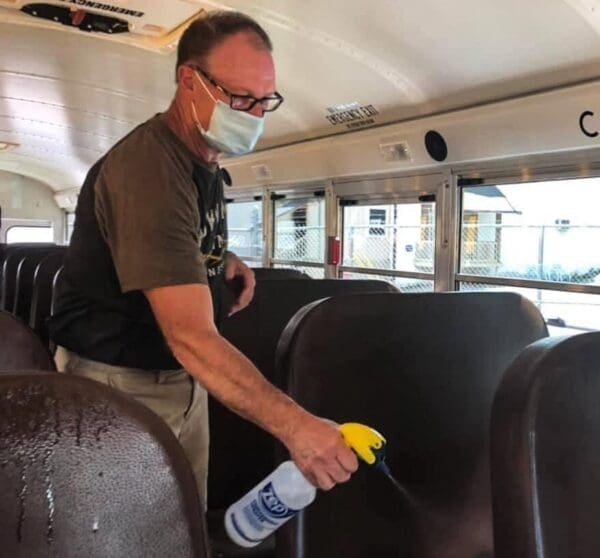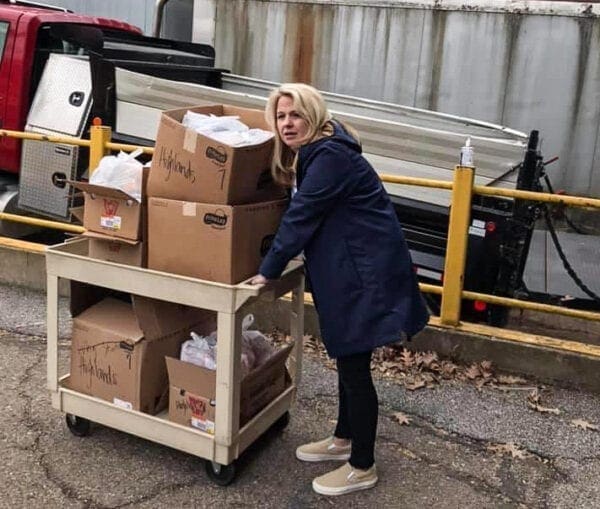The desktop computer in her office produces somewhat of a “ding” every time the superintendent of Ohio County Schools receives an email, and, frankly, the machine makes a lot of noise.
“Since Covid came, Kim Miller’s life completely changed,” explained Rick Jones, the assistant superintendent of Ohio County Schools. “For me, every school year seems to go quickly because there’s always something going on. For her, though? Well, let’s just say all of those emails, believe it or not, have been a very small part of it.”
Kim Miller was hired as superintendent in 2016 and immediately evolved several aspects of the school system’s mode of operation because, as a teacher and a principal, she’s always been a firm believer that public education needs to be about more than what is offered in textbooks. Since April 2020, though, the face of shuttered public schools changed as food distribution and broadband access became just as important as the delivery process of education.
Because of poverty levels in all counties in the Northern Panhandle, two servings of breakfast and a full lunch have been offered for free by the federal government since Dr. Kim Miller became the superintendent. When the pandemic caused the closures, however, nutrition superseded all else.
“It was proved a long time again that hungry kids don’t learn,” Miller said. “That’s why we do what we do to make sure they have access. When the virus forced us to close, we recognized immediately that the hungry issue wasn’t going anywhere.”

Kim Miller on Unprecedented Experience
Unless an individual is 103 years old or older, the coronavirus pandemic has been an unprecedented experience with shutdowns, closures, mandated behavior, sickness, and death touching everyone during the past 14 months.
School buildings throughout West Virginia were closed more often than open during the same time, athletic competition was permitted only on the collegiate and professional levels, and forced isolation worsened the mental health crisis in the United States.
“It has been a very long year that has included a lot of ups and a lot of downs,” Miller said. “It’s been a challenge; that’s for sure, and some of the downs have involved Covid and everything that has gone with the virus. It added so much uncertainty for everyone involved to the point that we didn’t know if we were going to be in the classrooms from one day to the next.”
Although the pandemic numbers decreased last summer and fall, a third spike over the holiday season further delayed in-class instruction and extracurricular activities in the Mountain State. According to the Wheeling-Ohio County Health Department, more than 4,300 positive tests have been recorded, and 86 associated deaths have taken place through Thursday.
“At one point after we had been out of the classrooms for so long, I believe many people started feeling as if we would never go back into our buildings,” the superintendent recalled. “That’s why, when we finally did, it was so great because that is, by far, the best way to deliver an education. Plus, not having extracurricular activities didn’t feel right, and the kids not being able to be with their teachers and friends was devastating for a lot of people.”

Some Will Stick
The “snow day” could be a thing of the past. Checking for homework assignments following a sick day might be as easy as striking a button. Parent-teacher conferences could conveniently go virtual.
Why?
Technology, that’s why, and Miller is the first to admit she is now fluent with online systems she had never encountered before something called Covid.
“Some of the big positives of this whole thing have involved adapting very quickly, and we have learned how to use new technology that we had never utilized before,” Miller said. “Those positive experiences are things that we will be able to retain and use in the future to improve the education that we offer our students.
“I have kept up with technology during my career, but what our tech people started to bring to me was impressive because I had never been introduced to it before,” she continued. “The students who used the new platforms adapted very well, and hopefully in the near future all of our students will have the same access.”

Miller estimated late last year that approximately 10 percent of the system’s 5,000-plus students do not have broadband available at their homes, so “packet learning” was made available to students during food distribution days. Hot spots were established at all of the district’s school buildings and also at more than 10 community locations throughout Ohio County.
Some students, though, did not interact with their teachers.
“During this whole thing, we have learned that education is the conduit for so much, including the care of the children,” the administrator said. “Because it was a very tough time for our parents, too, we saw a lot of our families experience a lot of challenges that took up a lot of time.
“I feel we did everything we could do to give all of our students broadband access so they could participate in the education that we were able to offer when our schools were closed,” Miller added. “That may not have worked in all cases, but I believe we did everything we could.”




